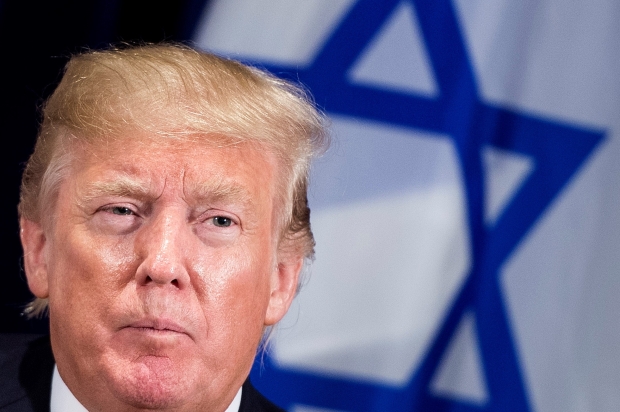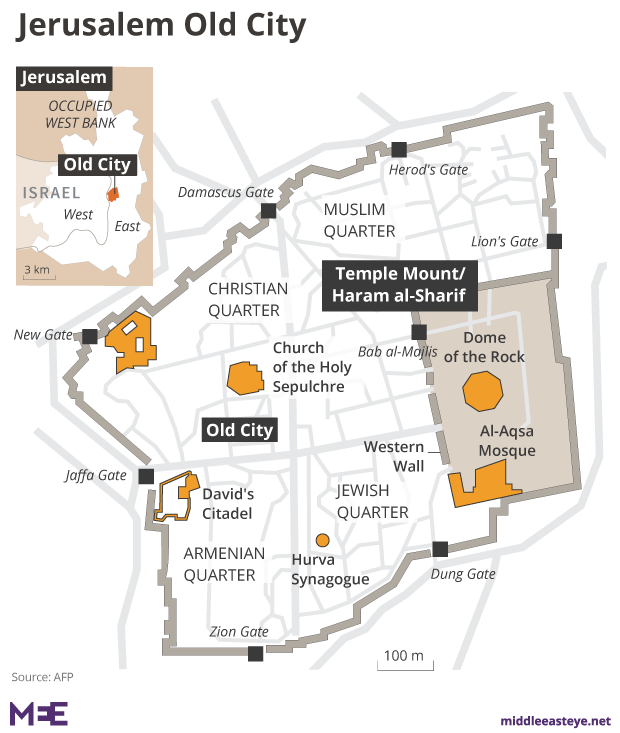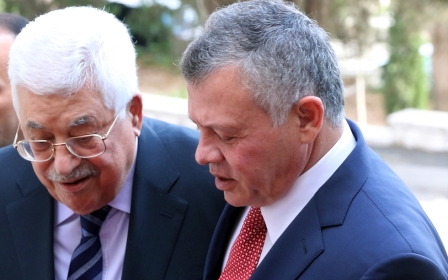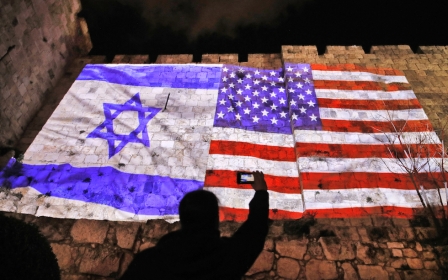Mahmoud Abbas should dissolve the Palestinian Authority

The claim that domestic considerations lie behind the US President Donald Trump's decision to recognise Jerusalem as a capital of Israel is almost certainly accurate. A decision of such magnitude would not have been made without taking into consideration its impact on the president's electoral base, especially in the so-called Bible belt of the MidWest.
The Jerusalem decision did not come out of the blue
This decision was also motivated by the pressing need to rally the Republican Party behind the president, who is facing a series of challenges and political crises.
Fomenting conflict
Yet it would be wrong to assume that Trump is simply dim-witted and bereft of the necessary knowledge to carry out foreign policy. Trump's style may seem a bit strange and unpredictable, but he is not as stupid as some of the observers of his presidency take him to be.
If the president could not assess the likely Arab and Islamic reactions to his decision, he would have certainly been informed by specialised State Department officials, as well as those around him, with accumulated expertise in foreign relations and in Middle Eastern affairs.
The Jerusalem decision did not come out of the blue. Trump, and some of the senior officials within his administration, repeatedly pointed to the matter throughout the months since he took charge of the White House.
This president has deliberately been adopting policies that are hostile to both the Arab and Islamic worlds, even when he is opposed by other institutions of the American state
In other words, it is clear that ample time was available to the administration to study various aspects of the Jerusalem issue. The US president must have known that his decision would not have passed without repercussions. Trump took his decision as part of a specific conception of the relations of the United States, and the West as a whole, with the Arabs and Muslims.
It is a conception that is underpinned by a conflict-based vision, by the belief in an imagined threat to Western civilisation and the position of the United States from the Arabs and Muslims.
If former US President Barack Obama chose to begin his reign with an attempt to reconstruct the image of the United States in the world, and in the Muslim world in particular, adopting a reconciliatory discourse towards the Arabs and Muslims, Trump has, right from the very start, been fomenting a climate of conflict and confrontation.
For this reason, and before any other, there has to be a response to Trump. Undoubtedly, the US decision amounts to a breach of international law and disregard of more than one UN Security Council and General Assembly resolution. It also represents a blatant bias toward Israel, and an effective relinquishment of the mediatory role in the negotiations to solve the Palestinian question.
Furthermore, it represents an act of contempt for the US's traditional allies, before its foes, in the Middle East. It is certainly a unilateral step that has not been supported or accepted by any of the other world powers.
Arab and Islamic response
These are sufficient reasons for the development of an Arab and Islamic response, notwithstanding the fact that the US decision will not change much on the ground, neither at the level of Israel's Judaisation policies in the city nor at the level of confiscating land and building settlements.
Yet there is one reason that should not by any means be overlooked: This president has deliberately been adopting policies that are hostile both to the Arab and Islamic worlds, even when he is opposed by other institutions of the American state.
He seeks to give the impression that he is about to embark on an all-out war against the values and sanctities of the Arabs and Muslims, either because this is the sort of policy that would safeguard the core of his electoral base, or because he is actually convinced of the illusion of the Arab and Islamic threat.
Trump's offensive move had to be met with complete denunciation at the UN Security Council and from all Western capitals. Not a single Arab or Islamic state could keep silent or express support, not even those states whom Trump reckoned would back his stance.
It is no longer a secret that the Trump administration is working on a new settlement for the Palestinian question. Although its outlines are not entirely clear yet, it seems that Trump's initiative is based on the idea of a comprehensive normalisation between Israel and the Arab states before presenting a framework for ending the conflict over Palestine.
By recognising Jerusalem as the capital of Israel, the mask of silence and indifference has been removed from the faces of Trump's Arab friends, who have been readying themselves to go as far as normalising relations with Israel.
However, no one can overlook the fact that the clearest and sharpest outcome of the US president's decision has been delivered on the streets of Arab and Islamic cities from Lahore and Diyarbakir to Cairo and Rabat, as well as on the streets of Palestinian cities and towns.
A third Intifada?
The Palestinians have started their third Intifada and the Arabs and the Muslims are regaining their great cause and what has been the pillar of their unity for many years. Trump cannot and should not be allowed to play the role of leader of the holy war without consequences.
Yet the return of the masses to the arena, within as well as outside of Palestine, will not be sufficient on its own to build a new balance of power. The Palestinian Authority needs to be aware of its own obligations.
These are not new. But they have now become more pressing as a result of the US decision. The Palestinian President Mahmoud Abbas was right when he declared his rejection of Trump's move. He was right to lodge a complaint with the UN Security Council against the decision.
He was right to cancel the meeting with the US vice president. He was also right when he stopped his security agencies from harassing the young men and women who confronted Israeli occupation troops on the streets of Palestinian cities and towns.
However, neither Abbas nor the PA can continue to stand up to US and Israeli aggressive policies under the present conditions. Abbas knows that his authority is dependent on US aid and on the aid of countries that are friends of Washington, whether Arab or non-Arab. The PA is also captive to Israeli control over all kinds of resources, financial and otherwise, essential for its survival.
Abbas knows that continuing to abide by a stance that is in harmony with the stance of his people means that costly sanctions and enormous pressures will be imposed on him and on the PA. The PA cannot even stop security collaboration with the occupying enemy.
The issue, in brief, is that the Palestinian president, today more than at any other time in the past, must realise that the PA has become more of a burden on the Palestinian national struggle, rather than a gain for this struggle.
Dissolving the PA in the West Bank would liberate the national struggle from its dependence upon the United States and its allies, as well as on the Netanyahu government.
Dissolving the PA would mean restoring the conflict to its basic and clear expression: the people versus the occupation.
The belief that Trump might go back on his decision is nothing but an illusion. What the new realities necessitate is not pinning hopes on illusions, but a major shift in the objectives and strategies of the Palestinian national movement.
- Basheer Nafi is a historian of Islam and the Middle East.
The views expressed in this article belong to the author and do not necessarily reflect the editorial policy of Middle East Eye.
Photo: A Jordanian woman holds placards in front of the American embassy in Amman on 15 December 2017, during a demonstration against the US president's decision to recognise Jerusalem as the capital of Israel (AFP)
This article is available in French on Middle East Eye French edition.
New MEE newsletter: Jerusalem Dispatch
Sign up to get the latest insights and analysis on Israel-Palestine, alongside Turkey Unpacked and other MEE newsletters
Middle East Eye delivers independent and unrivalled coverage and analysis of the Middle East, North Africa and beyond. To learn more about republishing this content and the associated fees, please fill out this form. More about MEE can be found here.








